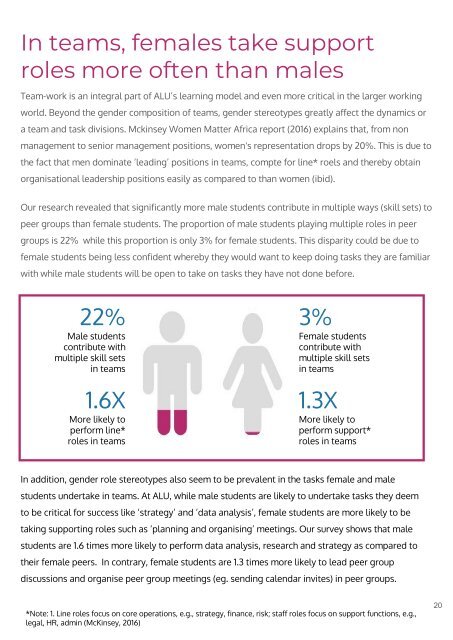Create successful ePaper yourself
Turn your PDF publications into a flip-book with our unique Google optimized e-Paper software.
In teams, females take support<br />
roles more often than males<br />
Team-work is an integral part of ALU’s learning model and even more critical in the larger working<br />
world. Beyond the gender composition of teams, gender stereotypes greatly affect the dynamics or<br />
a team and task divisions. Mckinsey Women Matter Africa report (2016) explains that, from non<br />
management to senior management positions, women's representation drops by 20%. This is due to<br />
the fact that men dominate ‘leading’ positions in teams, compte for line* roels and thereby obtain<br />
organisational leadership positions easily as compared to than women (ibid).<br />
Our research revealed that significantly more male students contribute in multiple ways (skill sets) to<br />
peer groups than female students. The proportion of male students playing multiple roles in peer<br />
groups is 22% while this proportion is only 3% for female students. This disparity could be due to<br />
female students being less confident whereby they would want to keep doing tasks they are familiar<br />
with while male students will be open to take on tasks they have not done before.<br />
22%<br />
Male students<br />
contribute with<br />
multiple skill sets<br />
in teams<br />
1.6X<br />
More likely to<br />
perform line*<br />
roles in teams<br />
3%<br />
Female students<br />
contribute with<br />
multiple skill sets<br />
in teams<br />
1.3X<br />
More likely to<br />
perform support*<br />
roles in teams<br />
In addition, gender role stereotypes also seem to be prevalent in the tasks female and male<br />
students undertake in teams. At ALU, while male students are likely to undertake tasks they deem<br />
to be critical for success like ‘strategy’ and ‘data analysis’, female students are more likely to be<br />
taking supporting roles such as ‘planning and organising’ meetings. Our survey shows that male<br />
students are 1.6 times more likely to perform data analysis, research and strategy as compared to<br />
their female peers. In contrary, female students are 1.3 times more likely to lead peer group<br />
discussions and organise peer group meetings (eg. sending calendar invites) in peer groups.<br />
*Note: 1. Line roles focus on core operations, e.g., strategy, finance, risk; staff roles focus on support functions, e.g.,<br />
legal, HR, admin (McKinsey, 2016)<br />
20




